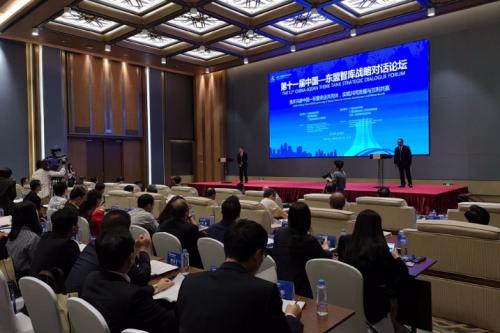



The China-Association of Southeast Asian Nations partnership serves as an anchor of regional stability, and creates mutual benefit through consensus-building, according to a think tank forum held in Nanning on Sept 18.
Further exchanges and cooperation will tap regional potential and accelerate partnership upgrades, said Chen Lisheng, president of the Guangxi Academy of Social Sciences at the 11th China-ASEAN Think Tank Strategic Dialogue Forum.
Zhang Yantong, vice chairman of the Counsellors' Office of the State Council, said "China and ASEAN have common prospects for stability and prosperity" amid the uncertainties in the world economy and emerging trade protectionism in some parts of the world.
"The China-ASEAN partnership is the anchor of regional stability," Zhang said at the forum. Moreover, innovation is the accelerator, while people-to-people connectivity is an important component.

Amphayvanh Khamsengsivilay, vice president of the Lao Academy of Social Sciences, said the changing era requires more conceptual understanding, joint undertaking of responsibilities and sharing of benefits.
A closer China-ASEAN community not only consolidates the basis for long-term friendship, but also brings rare opportunities for both sides to match development strategies, she said.
The strategic partnership of China and ASEAN and the new version of the present Silk Road (the Belt and Road Initiative) are becoming a new driving force in the world economy, she noted, adding the China-Laos friendship will help deepen regional cooperation with their diversified culture.
Pham Van Duc, vice president of the Vietnam Academy of Social Sciences, noted the development of relations and cooperation between the two sides has been going smoothly, "except for some misunderstandings and differences, such as lack of mutual trust and disputes on the South China Sea.
"These setbacks would be resolved by (building) mutual trust, benefit and understanding for development, stability and peace in the region and the world," he said.
Li Xiangyang, director general of the National Institute of International Strategy at the Chinese Academy of Social Sciences, said there is a need to adhere to correct perseverance concepts in promoting sustainable development of the Belt and Road Initiative.
The initiative is not "China Aid" as some refer to it, and enterprises, which aim for profits to survive, are the major players, Li said, correcting existing misunderstandings.
China may benefit from the initiative by opening more opportunities for its enterprises and increasing its soft power, but only "a balance of national influence at the macro level and corporate earnings at the micro level will sustain the initiative," he said at the forum.
Li also proposed engaged partners pay attention to relationships between "transfusing and producing blood", meaning offering aid and building capacity, between giving and taking and between long-term and short-term benefit.

Han Dachuan, deputy secretary general of the Chinese Academy of Social Sciences, also noted the BRI paved the way not only for economic cooperation, but also people-to-people exchanges.
Yang Jinghua, deputy director of the Standing Committee of the NPC of Guangxi Zhuang autonomous region, said consensus-building at think tanks promotes the consensus between governments and peoples, and this cooperation will lead to cooperation in other sectors.
She also called for the region to match their strategies, innovate mechanisms and upgrade channels of connectivity, adding Guangxi has entered an era of comprehensive opening in all directions, linking with both southern neighbors across the border and other parts of the country.
This year has been special to the region, as 2018 marks the 15th anniversary of the China-ASEAN Strategic Partnership, the starting year for the second China-ASEAN 50-year period of development, the 40th anniversary of China's reform and opening-up, and the fifth anniversary of the Belt and Road Initiative.
Other morning speakers at the forum include Sum Chhum Bun, vice president of the Royal Academy of Cambodia; Tang Min, counsellor of the State Council; BA Hamzah, director of the International Security Research Centre at the National Defence University of Malaysia; Tang Nong, president of Guangxi University of Traditional Chinese Medicine; Kyee Myint, member of Myanmar Institute of Strategic and International Studies; and Yan Jiehe, honorary chairman of the Zhuangyan Think Tank Institute, founder of Pacific Construction Group and president of Wuwei Academy.
Topics of three parallel panels in the afternoon session included pragmatic cooperation in promoting development of the China-ASEAN strategic partnership, jointly planning, building and sharing Belt and Road construction, and enhancing people-to-people exchanges in building a China-ASEAN community with a shared future.
The forum, held in the capital of the Guangxi Zhuang autonomous region, was jointly sponsored by the Chinese Academy of Social Sciences, the Counsellors' Office of the State Council and the people's government of the Guangxi Zhuang autonomous region. Co-organizers include the Guangxi Academy of Social Sciences, the Counsellors' Office of the People's Government of Guangxi and the China-ASEAN Expo secretariat.
Since its inception in 2008, the China-ASEAN Think Tank Strategic Dialogue Forum has stayed committed to providing a platform for idea exchanges, vigorous discussion, common visions and cooperation for think tanks, experts, and scholars in China and ASEAN countries.
If you have any problems with this article, please contact us at app@chinadaily.com.cn and we'll immediately get back to you.